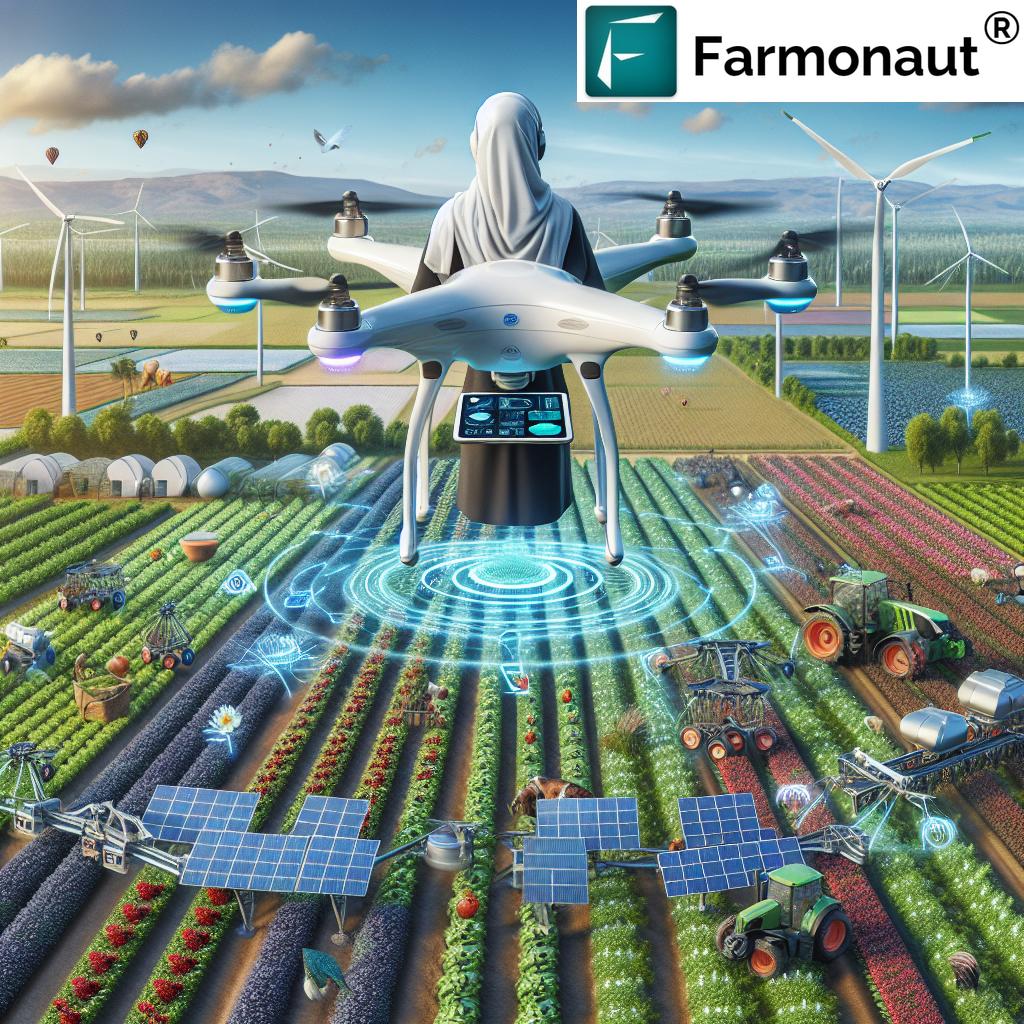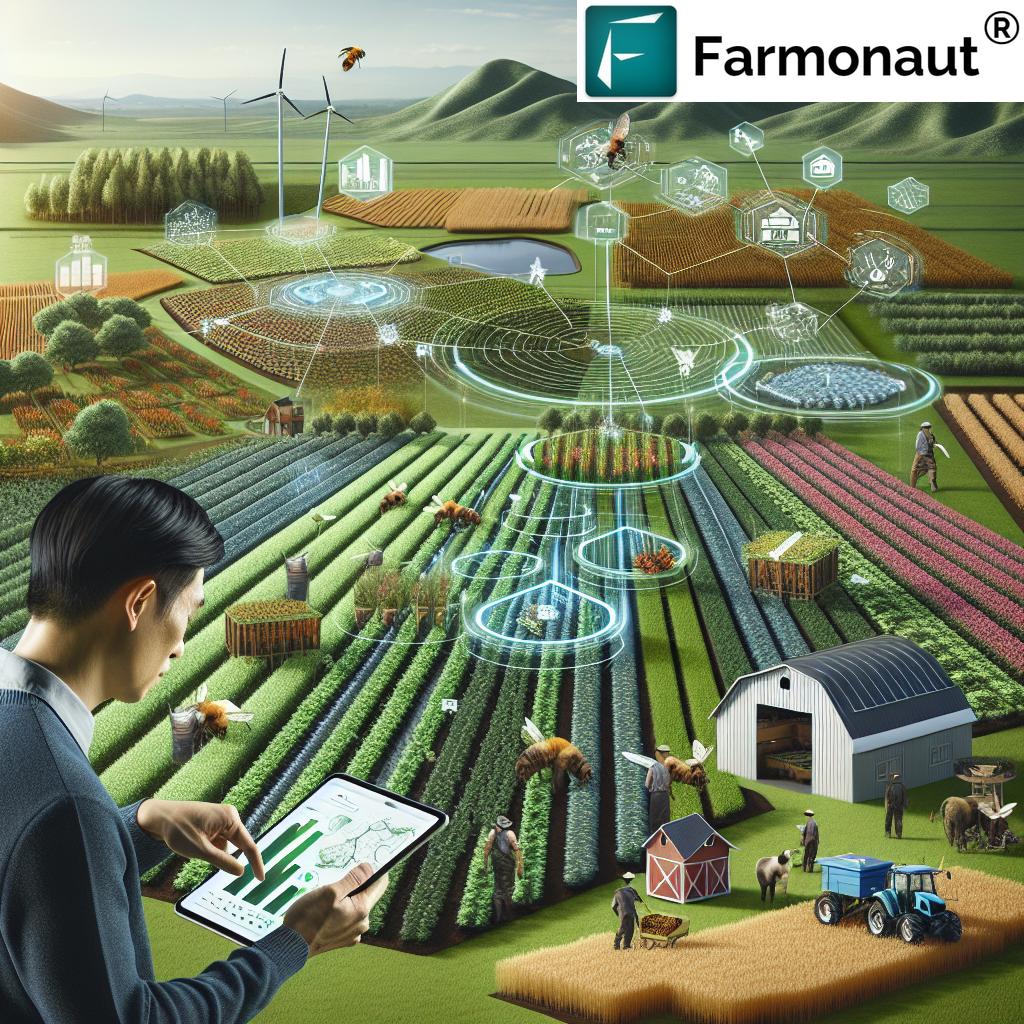Sustainable Agriculture Revolution: How Precision Farming and GIS Solutions Optimize Organic Crop Management

“Precision farming techniques can reduce water usage by up to 30% in organic crop management.”
In the evolving landscape of agriculture, we are witnessing a remarkable transformation driven by precision farming and GIS solutions. This revolution is particularly significant for organic crop management, where sustainability and environmental stewardship are paramount. At Farmonaut, we are at the forefront of this change, offering innovative technologies that empower farmers to optimize their practices while adhering to organic principles.
The Convergence of Organic Farming and Precision Agriculture
Organic farming has long been associated with traditional methods, but the integration of precision farming technologies is redefining what’s possible in sustainable agriculture. By leveraging satellite imagery, artificial intelligence, and data analytics, we can now enhance organic practices to achieve higher yields, better resource management, and improved environmental outcomes.
- Satellite-based crop health monitoring
- AI-driven advisory systems
- Smart irrigation solutions
- Precision application of organic inputs
These technologies allow organic farmers to make data-driven decisions, optimizing every aspect of their operations while maintaining the integrity of organic principles.
GIS Solutions: Mapping the Future of Organic Farming
Geographic Information Systems (GIS) have become indispensable tools in modern agriculture. For organic farmers, GIS provides a wealth of spatial data that can inform everything from crop rotation strategies to pest management techniques.
- Soil mapping for optimal crop placement
- Tracking biodiversity and natural pest control zones
- Monitoring water resources and drainage patterns
- Planning efficient organic fertilizer application
By integrating GIS data with real-time satellite imagery, Farmonaut offers organic farmers unprecedented insights into their land and crops. This level of detail allows for microzoning within fields, ensuring that each area receives the precise care it needs to thrive naturally.
Smart Irrigation Systems: Conserving Water in Organic Agriculture
Water conservation is a critical aspect of sustainable farming, and smart irrigation systems are revolutionizing how organic farms manage this precious resource. Our technology at Farmonaut enables farmers to:
- Monitor soil moisture levels in real-time
- Predict water needs based on crop type and growth stage
- Automate irrigation schedules for optimal water use
- Detect and address irrigation system inefficiencies
By implementing these smart irrigation techniques, organic farmers can significantly reduce water usage while improving crop health and yield.
Soil Health Optimization: The Foundation of Organic Success
Healthy soil is the cornerstone of organic farming, and precision agriculture tools are enhancing our ability to nurture this vital resource. Farmonaut’s technology provides detailed soil analysis, allowing farmers to:
- Track organic matter content over time
- Identify areas requiring specific organic amendments
- Monitor soil microbial activity
- Optimize cover crop strategies for soil improvement
By maintaining optimal soil health, organic farmers can naturally boost crop resilience and productivity without relying on synthetic inputs.
Crop Disease Prevention: Early Detection and Natural Solutions
Preventing crop diseases is crucial in organic farming, where chemical interventions are limited. Our advanced imaging technology can detect early signs of plant stress, enabling farmers to:
- Identify potential disease outbreaks before they spread
- Implement targeted biological control measures
- Adjust crop rotations to break disease cycles
- Enhance plant immunity through precise organic nutrient management
This proactive approach to disease management aligns perfectly with organic principles, promoting plant health through natural means.
Effective Pest Control Strategies in Organic Farming
Pest management in organic systems requires a holistic approach, and precision farming tools are making this more effective than ever. Farmonaut’s technology supports organic pest control by:
- Mapping pest populations and movement patterns
- Identifying beneficial insect habitats
- Optimizing the timing of biological pest control applications
- Monitoring crop health to enhance natural pest resistance
By leveraging these tools, organic farmers can maintain a balanced ecosystem that naturally keeps pest populations in check.
Agricultural Diversification: Enhancing Sustainability and Resilience
Diversification is a key strategy in sustainable agriculture, and precision farming technologies are making it easier for organic farmers to integrate multiple enterprises. Our GIS solutions support:
- Agroforestry planning and management
- Optimal placement of beehives for pollination and honey production
- Integration of livestock in crop rotation systems
- Design of multi-functional hedgerows and buffer strips
This approach not only enhances biodiversity but also creates new value streams for organic farms, improving overall resilience and profitability.
Renewable Energy Integration in Organic Farming
Sustainable energy use is an important aspect of organic farming, and precision agriculture is facilitating the integration of renewable energy systems. Farmonaut’s technology helps farmers:
- Assess optimal locations for solar panel installation
- Calculate energy needs based on farm operations
- Monitor and optimize energy consumption patterns
- Integrate biogas production from organic waste
By embracing renewable energy, organic farms can reduce their carbon footprint and operational costs simultaneously.
“Sustainable agriculture practices can increase soil organic matter by 1-2% over 3-5 years, improving crop yields.”
Arable Land Management: Maximizing Organic Production
Efficient management of arable land is crucial for organic farms, and precision farming tools are revolutionizing this aspect. Our satellite-based monitoring allows farmers to:
- Create detailed field maps for precision planting
- Monitor crop growth stages across large areas
- Identify variations in soil fertility within fields
- Optimize organic fertilizer application rates and timing
These capabilities enable organic farmers to maximize productivity while minimizing resource use and environmental impact.
Grassland and Forage Crop Optimization
For organic dairy and livestock operations, managing grasslands and forage crops is essential. Farmonaut’s GIS solutions support:
- Rotational grazing planning
- Monitoring pasture health and productivity
- Optimizing hay and silage production
- Identifying areas for pasture improvement
By leveraging these tools, organic livestock farmers can ensure sustainable feed production and optimal animal nutrition.
Explore Farmonaut’s API for advanced satellite data integration
Machinery and Equipment Innovations for Organic Farming
Precision agriculture is driving innovations in farm machinery tailored for organic systems. Our technology interfaces with modern equipment to:
- Guide precision weeding machines
- Optimize organic fertilizer spreaders
- Control variable-rate seeders for optimal plant spacing
- Manage autonomous vehicles for reduced soil compaction
These advancements are making organic farming more efficient and less labor-intensive, addressing one of the sector’s traditional challenges.
Storage and Preservation of Organic Produce
Maintaining the quality of organic produce post-harvest is crucial for reducing waste and ensuring profitability. Precision farming technologies contribute to this by:
- Predicting optimal harvest times for peak nutritional value
- Monitoring storage conditions in real-time
- Optimizing natural preservation techniques
- Tracking produce from field to market for traceability
These tools help organic farmers maintain the integrity and value of their produce throughout the supply chain.
Animal Health and Welfare in Organic Systems
For organic livestock operations, maintaining animal health without routine antibiotic use is a priority. Precision farming technologies support this by:
- Monitoring individual animal health metrics
- Optimizing feed formulations for natural disease resistance
- Tracking grazing patterns for optimal pasture management
- Early detection of health issues for prompt natural interventions
These applications ensure that organic livestock operations can maintain high welfare standards while meeting production goals.
Access our API Developer Docs for seamless integration
Policy and Certification Support for Organic Farms
Navigating organic certification requirements can be complex, but precision farming tools are simplifying this process. Farmonaut’s technology assists by:
- Generating detailed records of farm practices
- Providing evidence of compliance with organic standards
- Streamlining the audit process with comprehensive data
- Supporting applications for organic subsidies and grants
This support helps organic farmers focus on their core operations while ensuring they meet all regulatory requirements.
The Future of Organic Farming with Precision Agriculture
As we look to the future, the integration of precision farming and GIS solutions in organic agriculture holds immense promise. At Farmonaut, we are committed to driving this revolution forward, developing new technologies that will:
- Further reduce the environmental impact of farming
- Increase the productivity and profitability of organic systems
- Enhance food security and quality
- Support the transition to organic practices on a larger scale
By embracing these innovations, we can create a more sustainable and resilient food system that benefits farmers, consumers, and the planet.

Comparison of Conventional vs. Precision Farming Techniques
| Farming Aspect | Conventional Methods | Precision Farming with GIS |
|---|---|---|
| Irrigation | Uniform application, often excessive | 30% reduction in water usage through targeted application |
| Fertilizer Application | Blanket application, 40-60% efficiency | Variable rate application, 80-90% efficiency |
| Pest Control | Widespread spraying | 50-70% reduction in chemical use through targeted application |
| Soil Health Management | Generalized approach | 10-25% potential yield increase through precision soil management |
| Energy Consumption | High fuel usage for multiple operations | 15-20% estimated energy savings through optimized operations |
| Crop Yield Prediction | 60-70% accuracy based on historical data | 85-95% accuracy using AI and satellite data |
| Farm Equipment Efficiency | Manual control, potential overlap | 20-30% improvement through GPS-guided precision |
Embracing the Organic Precision Farming Revolution with Farmonaut
As we’ve explored throughout this comprehensive overview, the integration of precision farming and GIS solutions is transforming organic agriculture. At Farmonaut, we’re proud to be at the forefront of this revolution, offering cutting-edge technologies that empower organic farmers to optimize their operations while staying true to sustainable principles.
Our suite of tools, from satellite-based crop monitoring to AI-driven advisory systems, provides organic farmers with unprecedented insights into their land and crops. By leveraging these technologies, farmers can make data-driven decisions that enhance productivity, reduce resource use, and minimize environmental impact.
We invite you to join us in this exciting journey towards a more sustainable and productive future for organic farming. Whether you’re managing a small family farm or overseeing large-scale organic operations, Farmonaut has the tools and expertise to help you succeed.
Frequently Asked Questions
Q: How does precision farming benefit organic agriculture?
A: Precision farming enhances organic agriculture by providing detailed insights into soil health, crop conditions, and resource needs. This allows for more efficient use of organic inputs, better pest and disease management, and overall improved sustainability.
Q: Can GIS solutions really improve crop yields in organic farming?
A: Yes, GIS solutions can significantly improve organic crop yields by enabling precise management of soil health, water resources, and pest control. These tools help farmers make informed decisions that optimize growing conditions naturally.
Q: How does Farmonaut’s technology support organic certification?
A: Farmonaut’s technology provides detailed records of farm practices and conditions, which can be used to demonstrate compliance with organic standards. This documentation streamlines the certification process and helps maintain organic integrity.
Q: Is precision farming technology affordable for small organic farms?
A: Farmonaut is committed to making precision farming accessible to farms of all sizes. Our scalable solutions and subscription models ensure that even small organic farms can benefit from advanced agricultural technologies without excessive costs.
Q: How can I get started with precision farming on my organic farm?
A: Getting started is easy with Farmonaut. Simply sign up for our platform, and you’ll gain access to satellite imagery, AI-driven insights, and expert support to help you implement precision farming techniques tailored to your organic operation.
Join us in revolutionizing organic farming with precision agriculture and GIS solutions. Together, we can create a more sustainable, productive, and resilient future for agriculture.






